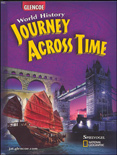
World History: Journey Across TimeChapter 18: Enlightenment and RevolutionChapter OverviewsDuring the 1400s and 1500s, Europeans began exploring the world. Trade, technology, and the rise of strong kingdoms led to this age of exploration. Spain built a large empire in America, and Portugal established a powerful trading empire throughout southeast Asia. Europeans developed a concept called mercantilism. The goal was to export more goods than were imported. Mercantilists also believed that countries should establish colonies. All of this exploration and trade led to the Commercial Revolution. In an effort to increase trade and profits, Europeans set up colonies, and entrepreneurs invested in joint-stock companies. Exploration and trade led to a worldwide exchange of products, people, and ideas known as the Columbian Exchange. The great thinkers of ancient Greece developed early forms of science and passed this knowledge to later civilizations. During the Middle Ages, Europeans accepted these theories as fact, but European interest in astronomy led to new discoveries and ideas about the universe and questions about religion. This new way of thinking led to the Scientific Revolution. Using the scientific method, Europeans developed new ideas about society based on reason. Following the Scientific Revolution, Europeans believed that science could be used to improve government and society. Many educated Europeans believed that reason was a better guide than faith or tradition. This belief led to the Enlightenment. Political thinkers of the time argued that natural law was the key to understanding government. French philosophes met to discuss their ideas about how to change their society. Ideas of the Enlightenment supported the argument for women's rights. Mary Wollstonecraft argued that women should have equal rights in education, the workplace, and in politics. Many of Europe's monarchs claimed to rule by the will of God under a system known as absolutism. As the Enlightenment spread, rulers tried to model their countries on the movement's ideas. Beginning in the 1600s, the French, English, and other European countries established colonies in North America while Spain focused on the Caribbean, Mexico, and South America. Some English settlers came to North America to make money, own land, or to find work, whereas others came in search of religious freedom. Jamestown was the first permanent English settlement in North America. The Virginia colonists established a representative government. Over time, the colonies produced constitutions, allowing colonists to elect assemblies and protect their rights. After winning a costly war against France, the British passed a series of laws that increased taxes, angering colonists. Colonists revolted to protest the taxes, and the American Revolution began. The Americans won the war with the help of France, and Great Britain recognized American independence in 1783. Four years later, delegates met to draft the U.S. Constitution, which borrowed principles from the Enlightenment, such as popular sovereignty and limited government. The United States of America was a republic with an elected president. Its citizens were promised freedom of religion, speech, and press, and the right to trial by jury. |  |















